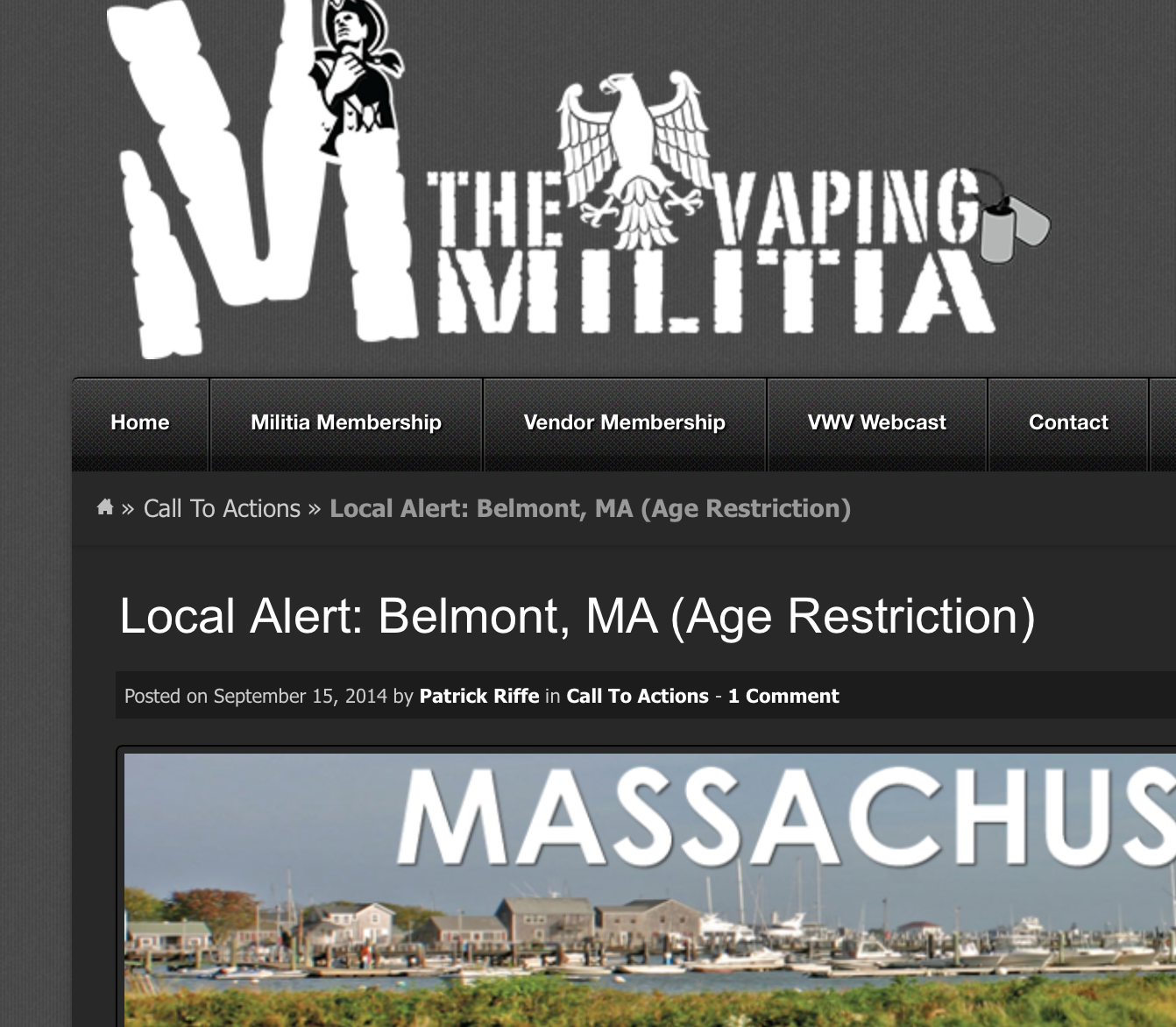Belmont Board of Health meetings are typically quiet affairs with little on the agenda to cause a stir. The last time the board was the center of residents ire was when it ruled two years ago to remove the Underwood Pool’s diving board on safety concerns.
But the board’s Wednesday, Sept. 17 meeting – set to take place at 5:30 p.m. in Town Hall – has caught the eye of a growing grassroots movement and they want their message heard in Belmont.
The Vaping Militia has sent out a “call to action” to its Massachusetts supporters that the health board would discuss and vote on raising the age to 21 for purchasing tobacco products in Belmont.
When asked about the militia, Board vice chair Dr. David Alper was as much in the dark as most people.
“Not a word. Never heard of them,” Alper told the Belmontonian.
“Just checked with the office, and they have also not received any calls or inquiries from them,” he said.
While one’s ears may prick up when a self-describes “militia” could be showing up at your front door, this newly-minted group isn’t a military force but advocates for the use of electronic cigarettes.
“We’re a national organization of people who are fighting for [a device] that helps so many people. We refuse to be quiet when our rights are being threaten,” said Art Barker, who co-founded The Vaping Militia in January.
Vaping is when a person uses a vaporizer or e-cigarette to inhale heated water vapor that contains nicotine, propylene glycol, solvents and flavors. For the majority of current users, vaping is their preferred avenue to quit smoking.
An explanation of vaping and how it differs from smoking tobacco can be found in this USA Today article.
For supporters, vaping is also a safer alternative to smoking cigarettes or other tobacco products “since it removes all the harmful carcinogens found in tobacco,” Barker told the Belmontonian. The lack of cancer-causing agents in the vapor also eliminates health concerns from second-hand smoke.
A trucker by trade, Barker smoked for 27 years, trying every known suppression project – from nicotine patches and gums – with limited success.
“A year-and-a-half ago, I started vaping and I quit tobacco that day,” said the Calimesa, California-native, who credits its use for markedly improving his health.
In the past year, national health organizations and national and local governments have taken a highly critical look at e-cigarettes. Last month, the American Heart Association called the Federal Drug Administration to require e-cigarettes to undergo a lengthy health review while banning their sale to minors and requiring warning labels similar to those found on cigarettes packs.
Vaping does have its supporters. Michael Siegel, a tobacco control expert at the Boston University School of Public Health, told USA Today that e-cigarettes are a benefit to public health as long as it’s used to quit smoking.
For vaping advocates, the threat to their rights is when restrictions to tobacco “dovetails into regulations on e-cigarettes,” said Barker. In fact, the group is “alright” with vaping age restrictions – “we see vaping products being for adults,” said Barker – but all too often new regulations from state and municipal entities “continues to loop all the other [stuff] onto vaping as if it’s a tobacco product.”
“We want to keep vaping viable but when we start seeing bans on its use in parks or just walking down the street, that’s when our freedoms are being threatened,” said Barker.
But Barkers’ defense of helping people quit smoking or preserving their rights will hold little sway with Belmont’s Board of Health.
At Wednesday’s meeting, the focus will not only be on setting a minimum age to purchase all tobacco products to 21, up from 19, but also to broaden the definition of tobacco products to include the e-cigarette, said Alper.
“As e-cigarettes did not exist when the current regulations were written, this updating seems most appropriate to address,” said Alper.
“By including e-cigarettes in the definition, they will be treated like any other tobacco/nicotine product and will, therefore, require a license to sell and limitations on where they can be used, in order to protect nonsmokers,” he noted.
And if Militia members show up?
“It is an open public hearing, and anyone is welcome to attend,” said Alper.








Leave a Review or Comment